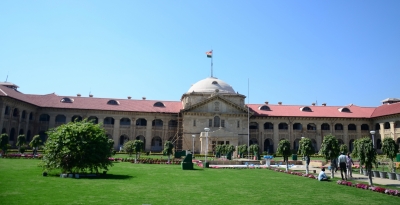Prayagraj, UP, Nov 19, : .In response to 17 interfaith marriage petitions, the Allahabad High Court asked the Central government for a panel to implement Article 44.
Article 44 states that “the state shall endeavor to ensure for the citizens a Uniform civil Code (UCC), throughout the territory and India”.The court ordered the officer of petitioners’ districts, or marriage registrar to register immediately the marriage of petitioners.
This was without waiting for approval from the relevant district authority in regard to the conversion of faith.
The UCC today is a necessity.As B.R.observed, it cannot be made “purely voluntary”.”As a result of the fear and apprehension expressed by members of the minority community 75 years ago, Ambedkar was convicted,” said the court.
Justice Sunet Kumar stated that it was urgent for Parliament to create a single family code in order to prevent interfaith couples being treated as criminals.
The court noted that “the stage is reached where the Parliament should intervene to examine whether the country needs multiplicity in marriages and registration laws, or whether parties to a wedding should be brought under single-family codes.”
Standing counsel for Uttar Pradesh pointed out that petitioners could not register their marriage without inquiry by the district authorities because they didn’t get mandatory permission from the district magistrate prior to converting to faith with the intention of marrying.
However, the petitioners counsel argued that citizens are entitled to choose their faith and partner; the conversion occurred out of free will.
“Interference by either the state (or private respondents) would be tantamount to an encroaching on their constitutional rights to freedom, choice and life liberty, and to live their lives according to their own terms,” counsel stated.He also said that registration of marriage requires prior approval from the district authority.
After that, the bench stated that marriage is simply an association between two people recognized under law.It is not unusual for marriage to be subjected under various laws in different communities.This would create barriers to the free and open intermingling among citizens.These petitioners cannot be treated as criminals.
Later, the court directed the officer or marriage registrar of petitioners’ district to register immediately the marriage of petitioners.This was without waiting for approval from the relevant district authority in regard to conversion of faith.
Justice Sunet Kumar passed the court order and allowed the petitions of Mayra, a.k.a.Vaishnavi, along with 16 other petitioners dealing in interfaith marriages, urged the Union government not to delay the proceedings.
The court stated that marriage is simply an association between two people, which is recognized under law.
In an effort to imagine the potential impact of UCC upon the Indian population, the court referred to HFC (Hindu Family Code), which, according to court opinion, acts as a uniform civil code that integrates citizens into an integrated, united Indian citizenry.It is also uniform in terms of the family law law.
The court noted that the HFC was the basis for the transformation of traditional Hindu society.Furthermore, legislations were passed which lifted the Hindu personal laws from the shastra, or religion, and put them within the purview of the Parliament.
Major petitioners.
One of the spouses had converted to the faith or religion of their partner.They had arrested threats to their lives, liberty, and well-being.
They had therefore filed writ papers seeking to register their marriages and protect them.
amita/khz/
#Allahabad #asks #Centre #unim #civil







